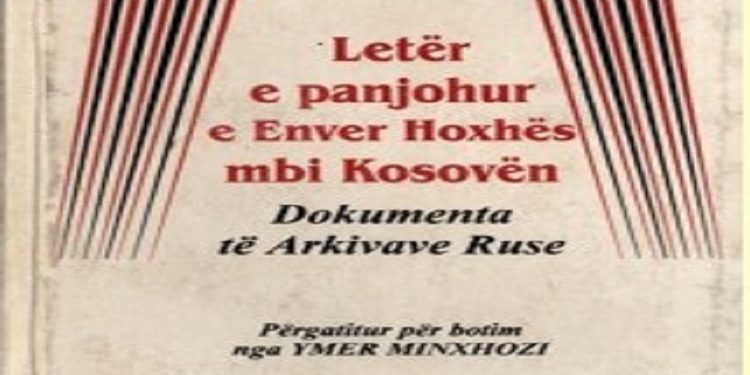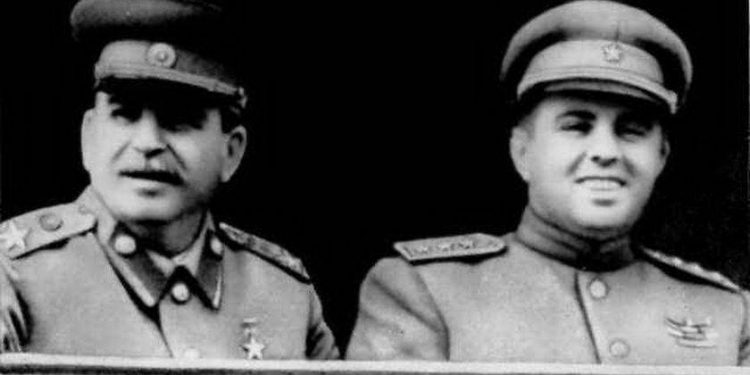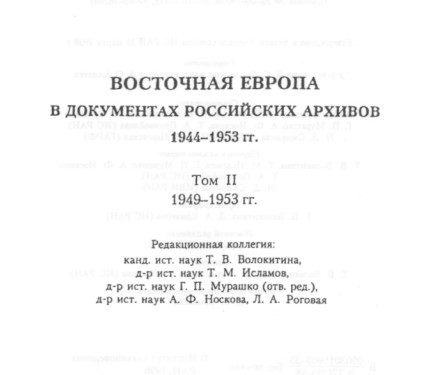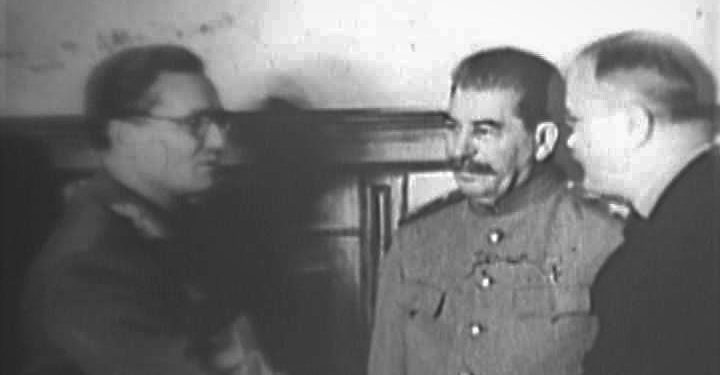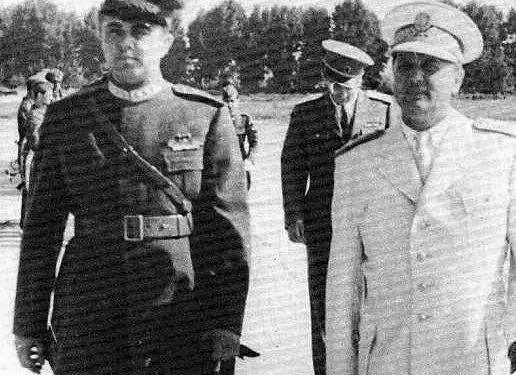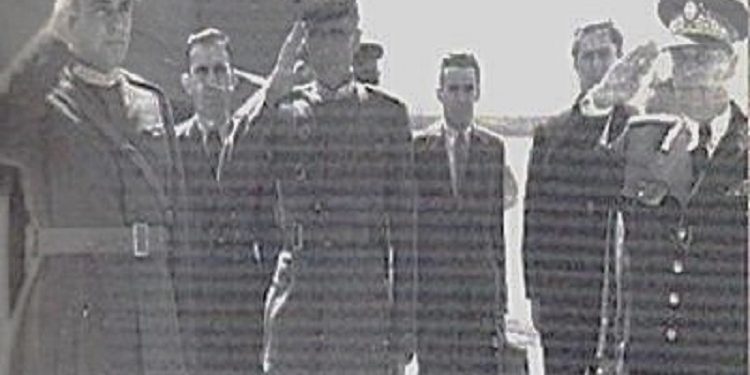“His idea was for Kosovo to overthrow the Tito regime, to create a Communist Party in Kosovo, and then to join…” / The Testimony of a Well-known Historian about Enver’s Letter to Stalin
Memorie.al / The Soviet Union knew almost everything that was happening in Albania. The superpower’s “receptors” were not merely diplomatic representatives in Tirana or agents, but the Albanian leaders themselves, until the moment relations broke down, were ready to inform and seek opinions from the center of communism. In some cases, they would not take a single step unless they first received a response from the Soviet Union. For some time, the book “Albania and Kosovo in the Russian Archives 1946-1962,” a publication of the Center for Albanological Studies, Institute of History, by historians Hamit Kaba and Ethem Çeku, has been available to Kosovar readers.
A book of special importance for shedding light on the history of Albania, it offers 72 documents, letters, transcripts of conversations and meetings between Russian diplomats and Albanian and Yugoslav leaders. A series of important events that coincide with the Albanian-Russian fraternity emerge in these documents from a different perspective. The historian Prof. Dr. Hamit Kaba, who has spent a lot of time in the Russian archives, explains to us through an interview what these book offers, who the characters and topics mentioned in it are.
How Albania’s relations with the Soviet Union, how were was the figure of Enver Hoxha described, what was his position in this lopsided relationship with the Russian superpower… Kaba goes beyond the publication, bringing us other examples and facts that are not included in the book that has just been published.
Kaba, you are one of the authors of the book “Albania and Kosovo in the Russian Archives.” What does this book offer to the reader, and in particular, what is its importance for the history of Albania?
This book, which I prepared together with my colleague, Assoc. Prof. Ethem Çeku, was published some time ago in Pristina, where we also had a promotion, which we hope to realize in Tirana as well. In our opinion, it is an important publication for Albanian history because these are Russian documents unknown in the Albanian environment, the majority of which have been published in the Russian language and have not been translated into Albanian, and another part are genuine archival documents resulting from my research in the Russian archives in 2007.
Given that we are dealing with the documents of a great state, a superpower of the time, the leader of a communist bloc and one of the most important and major players of the Cold War, they shed light on important problems of our history and I believe they will be read with curiosity not only by researchers and specialized readers but also by the simple reader in Albania and Kosovo to satisfy their curiosity.
What do these documents cover and how do the Russians consider the “number one” of that time in Albania, Enver Hoxha?
Of course, the “number one” holds the main place and Enver Hoxha was considered as such in the Russian archival documentation. This book summarizes documents from 1946-1962, covering almost the entire period of Albanian-Russian relations.
There are important documents about Albania’s relations with Yugoslavia, how Soviet diplomats in Tirana or Moscow perceived them, there are reports on Yugoslav-Soviet relations that concern Albania, but there are also reports on internal relations in Albania, how they were conceived by the Soviet leadership and how much it influenced the development of these events, even their escalation.
Among all this multitude of documents, could you single out any of particular importance?
There are several documents of particular importance, but I will single out one of them, which belongs to the period after Enver Hoxha’s visit to Belgrade in June 1946. Unfortunately, we do not have authentic documents of the conversations (including face-to-face ones) and, as far as we know, they have not been published to this day, not even by the Yugoslav side. But we have reflections and opinions from this case, such as those expressed in a meeting of the representative of the Yugoslav mission, Josiv Gjergja, with the Soviet ambassador in Albania, after Enver’s visit to Belgrade.
When the Soviet ambassador asked him about the conversations held at this meeting, Gjergja told him that Enver also raised the issue of Kosovo and Metohija, but he is dissatisfied with why he raised it and the way Enver raised this problem. He used the phrase that; “Enver did not speak like a communist-to-a-communist with Tito,” but spoke many things from a distance.
So, he had reservations about the issue of Kosovo. I cannot say from this publication, but from other sources and publications, there are documents that talk about the treatment of the Kosovo issue, but Enver Hoxha did not present it as a problem for a solution.
You think that in June ’46, a friendship treaty with Yugoslavia was being prepared, and Enver wanted this treaty to also talk about Kosovo, but not as an issue for a solution at the moment, but as an issue that required a solution in the future. Enver wanted this in a way to achieve something that the Albanians wanted.
But according to Gjergja, Tito did not accept it and, in his personal opinion, this would be very bad for Albania. In that conversation, he says that they were encountering many problems in Kosovo and OZNA has a lot of trouble, imagine if Kosovo were to unite with Albania, what could happen. According to him, this unification could lead to the destabilization of the Balkans.
How does Enver Hoxha appear in reports or correspondence, what is his position vis-à-vis a superpower like the Soviet Union?
I have seen many conversations, at the center of which is Enver Hoxha and his reports with high leaders, including with Stalin. But there are also about meetings of other high leaders of the Communist Party, later the PPSh (Party of Labor of Albania), like Koçi Xoxe, Nako Spiru, Tuk Jakova, etc.
Of course, in these discussions, Enver, I can say with conviction, knew how to raise problems, how to get out of a situation, how to dominate the situation in a way, but he also knew how to be convinced when he was not in the same line with the communist leadership. I will bring you a case.
In 1949, there is a letter from Enver Hoxha, who on behalf of the Central Committee of the PPSh, sends it to the Central Committee of the Communist Party of the USSR (Union of Soviet Socialist Republics), and to Stalin, about the problem of Kosovo. We keep in mind that after the breakdown of relations between the Soviet Union and Yugoslavia, the latter became a target of the Communist Bloc.
Albania was also part of this anti-Yugoslav campaign. Enver Hoxha took advantage of this opportunity to raise the issue of Kosovo. The letter, which is not published for the first time, is about 10 pages long. I took it myself from the archive in Moscow and published it as he sent it, even in the Gjirokastër dialogue, where he asks for Kosovo to be attached to Albania, but in an imagined reality.
Which means…?
His idea was for Kosovo to first overthrow the Tito regime, for a Communist Party to be created in Kosovo, and then for it to join Albania.
Of course, I have not said what happened later, but from other documents, we learn that Stalin did not give an official response, but in a later meeting in Moscow, he told him that this problem could not be solved because; “we do not want to have the peoples of Yugoslavia against us and secondly, the Kosovars cannot go that far and create a communist party, because they are not communists, but nationalists.”
And he was right. Of course, Enver accepted it. So, he knew how to retreat, he knew how to ask and sacrifice others to maintain his own power.
From a geopolitical point of view, how important was Albania to the Soviet Union?
From my research, not only from Russian documents but also American and British ones that I have had the opportunity to consult and get to know, I say that Albania undoubtedly had geopolitical importance, especially after the breakdown of relations between the Soviet Union and the former Yugoslavia, but we Albanians load ourselves with some dimensions that I do not think we have.
We know that in 1955, Albania was accepted into the Warsaw Treaty, the first treaty that we can call equivalent to a treaty of friendship and mutual assistance, with the Soviet Union.
The Soviet Union had signed such treaties with all countries, except East Germany and Albania. It was known that East Germany presented other problems, a history almost unpredictable; it was like a front line, while Albania was not like that.
In fact, there is data that the Albanian government asked as early as the beginning of the 50s for a military base to be created in Albania, and the Soviet government did not approve it at that time.
I can bring you the case of the Russian withdrawal from the Vlora base, which we present on a gigantic scale. In the Political Bureau of the Central Committee of the Soviet Union, when Khrushchev says that the departure does not have a big cost, “because the submarines that are there are of the World War I type.”
I cannot say this, because I am not a specialist in this field, but I know that the submarines were produced later, but it may have been a kind of anger of Khrushchev, who was known as an emotional man.
Are the documents you publish transcripts of recorded conversations? Can we draw a parallel between them and “Wikileaks,” regarding the impact they might have?
I do not think they are like that, because these documents have been archived, a very long time has passed and the people who sent them are no longer alive. These documents are published within all international rules.
But they are important, because they realistically describe our history. 20 years have passed and we still wander to realize this process. These documents will help us and I think we are going in this direction.
Are there other documents in these archives that would be useful for shedding light on our history?
Without a doubt, there are documents and I think some of them would be necessary for our history. The period of the Russia-Albania conflict, 1959-62, has many documents, of which only a small part has been published. But working in the Russian archives is not easy.
There is a difference from the West. After Putin came to power, unfortunately, steps have been taken backward in opening the archives. There is a kind of centralization. There are documents that are legally available, but when it comes to using them, it is difficult to get them.
Letter from Enver Hoxha to the Central Committee of the Communist Party of the Soviet Union
“On Kosovo and Metohija”
The Albanians of Kosovo, who live in the Yugoslav Republic, constitute a considerable minority. This Albanian minority lives adjacent to the border of the People’s Republic of Albania. The Congress of Berlin and the Treaty of Versailles have unjustly violated the interests of Albania and the Albanian minority in Kosovo.
According to old pre-war statistics (statistics falsified by the regimes of the Serbian kings, with the aim of proving that this Albanian minority was small), there are about 700 thousand Albanians. In all of Yugoslavia: Kosovo, Metohija, Macedonia, and Montenegro, the number of Albanians can reach one million people, if not more.
In these statistics, the regimes of that time have tried to massacre another part of the Albanians, calling them Muslims or Turks. The Albanians of Kosovo, Metohija, etc., have considered and continue to consider it a great injustice that has been done to them, by separating them from Albania, their homeland.
They have not accepted this solution and do not accept staying under Yugoslavia and under any existing regime in Yugoslavia. This is the reality. Their only ideal is unification with Albania…!
The Albanians of Kosovo, after the great massacres of the Great Serbs and in a downtrodden political state, could not trust the “Yugoslavs,” whoever they were.
The Yugoslav Communist Party neglected this moment, and this was not by chance. The organization of the National Liberation War in Kosovo, under the leadership of the Yugoslav Communist Party, was done in this nationalist spirit: The Yugoslav Communist Party did not create any special national committee for Kosovo and Metohija, where the leadership would be mainly Albanian and would organize the party and the war and specify the issue of the Albanians of Kosovo and Metohija.
Not only did it not do this, but the Yugoslav Communist Party has tried not to raise the issue of Kosovo in any way, not to raise the Albanian masses of Kosovo in a patriotic spirit, not to allow them to hold the Albanian flag alongside the Yugoslav flag (a great symbolic sign for them that would become a mobilizing tool).
But, the Central Committee of the Yugoslav Communist Party has suppressed these aspirations of the people of Kosovo, fought them, and condemned them when we showed and proposed them…!
We thought that the issue of Kosovo could not be discussed during the National Liberation War and that the line of our party, as we defined it above, was correct. Yugoslavia in the National Liberation War was the ally of our people and we could not fall into the positions of Albanian reaction.
Our Party has taken a stand on Kosovo and has successfully gone against fascist demagogy; it has announced joint declarations with the Yugoslav Communist Party. To the Albanians of Kosovo, where it called them to war against the common enemy.
On the eve of the liberation of Yugoslavia and Albania, we again thought that we could not raise the issue of the unification of Kosovo with Albania, because we were before the tasks of strengthening and consolidating our popular democratic powers…. at the time of the signing of the treaty with Yugoslavia, we thought that it was the moment when the issue of Kosovo and Metohija should be raised and at this moment this issue was presented by me to Tito.
Tito answered me: “that Kosovo is Albanian and that it should unite with Albania; we sincerely desire this, but we cannot do it now, because the Great Serbian reaction is still strong and such a just act will harm us.” All these were proven to be demagoguery. In the current situations after the discovery of the treason of the Tito group, we think that the issue of Kosovo should be raised…!
We think that the Albanian people of Kosovo, Metohija, Macedonia, and Montenegro, should fight to be liberated, just as other peoples of Yugoslavia will do. The first thing he must do is to enter into a fierce war against Tito’s clique, up to armed rebellion. He must start the war as soon as possible. If others start it, so much the better, because this avoids the isolation and oppression of the movement in Kosovo.
The people of Kosovo must consider their struggle closely linked to the struggle of all the peoples of Yugoslavia, within the Yugoslav framework, because otherwise, they will be isolated and oppressed…! But the point is that the mistakes of the Yugoslav Communist Party must not be repeated in connection with Kosovo and Metohija.
Kosovo and Metohija must have their own leadership that emerged from the war, with a National Liberation Committee, which will determine the line of the war based on the Resolution of the Information Bureau and on Marxist-Leninist-Stalinist principles.
In the war, the part of the Internationalist Communist Party for Kosovo and Metohija must be created, organized, and tempered, within the framework of the Internationalist Yugoslav Communist Party. The Albanians of Kosovo and Metohija should fight with the Albanian flag…!
We think that Kosovo, Metohija, and a part of Macedonia bordering Albania that is inhabited by Albanians, should be joined to Albania, after Yugoslavia is liberated from Tito’s claws…!
The issue that we present to you about Kosovo and Metohija becomes current in connection with the help that our Party gives to the anti-Tito Yugoslav comrades and to the people of Kosovo and Metohija, who want and are ready to fight with all means the traitors of Belgrade, but that the Kosovars at every moment put before us the question: “How will the national problem of Kosovo and Metohija be solved”?
We think that this issue is very important, we may even be wrong in our consideration of it, therefore we will not take any step without consulting comrade STALIN and therefore we are presenting these our views and, if we are wrong, to be pointed out to us immediately to correct them./ Memorie.al
For the Central Committee of the PPSH
Enver Hoxha




